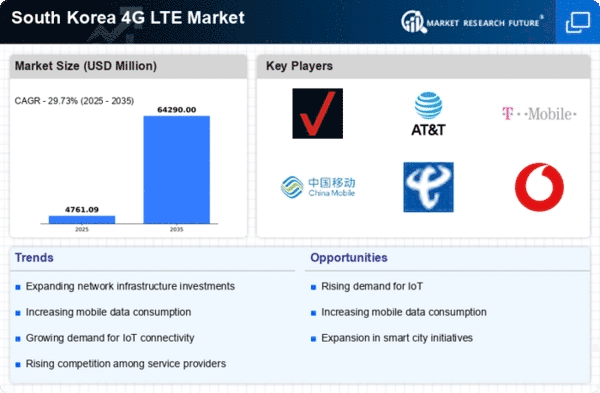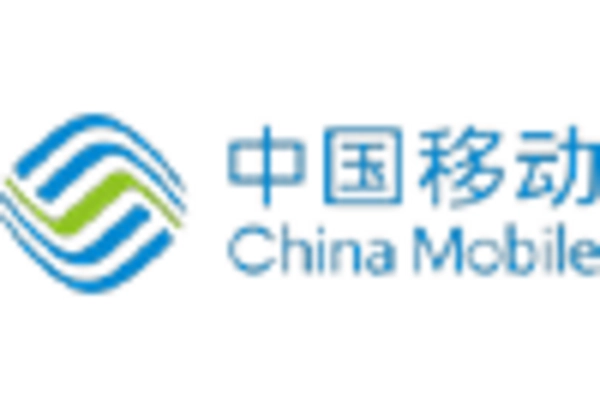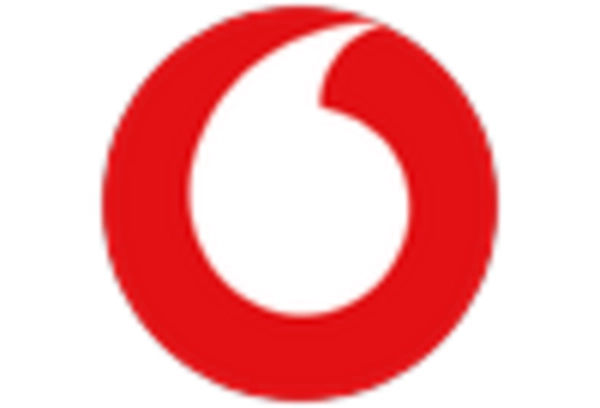Emergence of Smart City Projects
The development of smart city projects in South Korea is driving the 4g lte market forward. These initiatives aim to integrate advanced technologies into urban infrastructure, enhancing the quality of life for residents. As of November 2025, several cities are implementing smart solutions, such as connected traffic systems and public safety applications, which rely heavily on robust mobile connectivity. The 4g lte market plays a crucial role in supporting these projects, as reliable network infrastructure is essential for the seamless operation of smart city applications. The increasing investment in smart city technologies is likely to create new opportunities for growth within the 4g lte market, as demand for high-speed connectivity continues to rise.
Rising Mobile Device Penetration
The proliferation of mobile devices in South Korea is a key driver for the 4g lte market. As of November 2025, mobile device penetration in the country is estimated to exceed 130%, indicating that many individuals own multiple devices. This high penetration rate fosters increased demand for mobile data services, as users seek seamless connectivity for various applications. The 4g lte market benefits from this trend, as service providers are compelled to enhance their offerings to accommodate the growing number of users. Furthermore, the increasing reliance on mobile devices for daily activities, such as online shopping and social media, further propels data consumption, thereby driving the need for robust 4g lte infrastructure.
Advancements in Network Technology
Technological advancements in network infrastructure are significantly influencing the 4g lte market. South Korea is recognized for its cutting-edge telecommunications technology, with ongoing investments in enhancing network capabilities. The introduction of carrier aggregation and advanced antenna technologies has improved data speeds and network reliability. As of November 2025, the average download speed for 4g lte users in South Korea is reported to be around 50 Mbps, which is among the highest globally. This level of performance attracts consumers and businesses alike, as they seek efficient and fast connectivity solutions. Consequently, the 4g lte market is likely to experience growth as users increasingly demand high-speed internet for various applications, including streaming and gaming.
Increased Demand for Mobile Entertainment
The surge in mobile entertainment consumption is a prominent driver for the 4g lte market. In South Korea, the popularity of streaming services, mobile gaming, and social media platforms has skyrocketed, leading to a substantial increase in data usage. As of November 2025, it is estimated that mobile video streaming accounts for over 70% of total mobile data traffic in the country. This trend compels service providers to enhance their 4g lte offerings to meet the growing demand for high-quality streaming experiences. The 4g lte market is thus positioned to benefit from this shift, as consumers increasingly seek faster and more reliable connections for their entertainment needs.
Government Initiatives for Digital Transformation
The South Korean government is actively promoting digital transformation initiatives, which serve as a catalyst for the 4g lte market. Policies aimed at enhancing digital infrastructure and connectivity are being implemented to support economic growth and innovation. As of November 2025, the government has allocated approximately $1 billion towards expanding 4g lte coverage in rural areas, ensuring that underserved populations have access to reliable mobile services. This initiative not only boosts the 4g lte market but also fosters inclusivity and equal opportunities for all citizens. The government's commitment to improving digital infrastructure is expected to stimulate further investments from private sector players, thereby enhancing the overall market landscape.
















